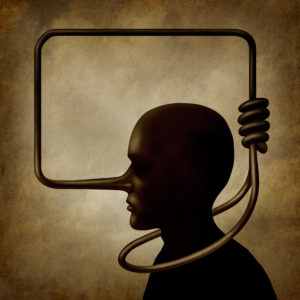Warning: Trying to access array offset on value of type bool in /home/daneciolino/public_html/lalegalethics/wp-content/plugins/footnotation/footnotation.php on line 193
 On September 16, 2016, the Supreme Court of Iowa suspended Des Moines lawyer Kathryn Barnhill for lying to her opponent about whether she had sent a partial fee refund to her former client after being ordered to do so by an arbitration panel.1 See Iowa Sup. Ct. Att’y Disciplinary Bd. v. Barnhill, No. 16-0731 (Sep. 16, 2016).
On September 16, 2016, the Supreme Court of Iowa suspended Des Moines lawyer Kathryn Barnhill for lying to her opponent about whether she had sent a partial fee refund to her former client after being ordered to do so by an arbitration panel.1 See Iowa Sup. Ct. Att’y Disciplinary Bd. v. Barnhill, No. 16-0731 (Sep. 16, 2016).
The Iowa Rules of Professional Conduct—like the ABA Model Rules and the Louisiana Rules—prohibit a lawyer from making “a false statement of material fact or law to a third person.” See Iowa Rules of Prof’l Conduct R. 32:4.1(a). The issue before the court was “whether opposing counsel is a third person within the meaning of the rule.”
In finding that the rule does prohibit false statements to opposing counsel, the court opined as follows:
The Iowa Rules of Professional Conduct include a rule addressing fairness to opposing parties and counsel. Iowa R. Prof’l Conduct 32:3.4 . However, unlike the rule preceding it, which addresses candor toward the tribunal, rule 32:3.4 does not expressly address a duty of candor toward the opposing party and counsel. Compare id ., with id.r. 32:3.3. Instead, rule 32:3.4 primarily addresses discovery conduct and an attorney’s presentation of their client’s evidence and testimony. See id.r. 32:3.4 cmt. 1 (“Fair competition in the adversary system is secured by prohibitions against destruction or concealment of evidence, improperly influencing witnesses, obstructive tactics in discovery procedure, and the like.”). Nonetheless, we conclude the absence of an express prohibition against false statements to opposing counsel in rule 32:3.4 does not exclude opposing counsel from the universe of third persons mentioned in rule 32:4.1.
Notably, the Iowa court cited a 1990 Louisiana Supreme Court opinion in support of its conclusion:
[O]ur research reveals some courts in other jurisdictions with materially similar or even identical ethical rules consider opposing counsel a third person within the meaning of the rule. See, e.g., In re Corizzi, 803 A.2d 438 , 441 & n.5 (D.C. 2002); Louisiana State Bar Ass’n v. Harrington, 585 So. 2d 514 , 519 (La. 1990); Att’y Grievance Comm’n v. Trye, 444 Md. 201 , 118 A.3d 980 , 990 (Md. 2015); In re Walsh, 872 N.W.2d 741 , 749 (Minn. 2015) (per curiam); In re Edison, 2006 ND 250 , 724 N.W.2d 579 , 584 (N.D. 2006) (per curiam); Office of Disciplinary Counsel v. Battistelli, 193 W. Va. 629 , 457 S.E.2d 652 , 660 (W. Va. 1995). Today we join those jurisdictions and hold an attorney can violate rule 32:4.1(a) by making a false statement of material fact to opposing counsel.
- This arbitration award was entered after Barnhill billed a client $60,000 for work on a case in which the amount in controversy was less than $20,000. ↵
